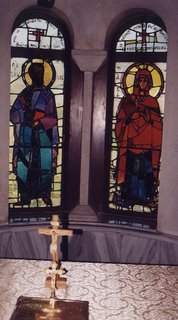Intro to Philippians

City of Philippi:
Philippi was originally a Greek city renamed by Alexander the Great’s father, King Philip. It was later made a Roman colony, and was found near the Greek coast near in the Northern Aegean sea. Today if looked on a map it would be in Greece just below the Bulgarian border (north of modern city of Kavala). At the time of Paul it was part of the Roman region of Macedonia.
The citizens were proud to be Roman citizens and this came with a tremendous amount of privilege at the time.
It was also a wealthy city. There were a lot of natural resources around the area, and it was nice trading community.
(the river where they prayed and were probably baptized)
Founding of the Church (Acts 16):
Paul and his traveling companions had been working in Asia Minor and were intent on ministering further in Asia, yet God stopped them (6). Paul had a vision that a man from Macedonia was calling to him to come help him. Paul and his companions (Silas, Luke, & Timothy) took this as God command to move toward the European mainland (9).
Upon arriving in Macedonia, Paul followed his normal pattern of evangelism: 1. go to a large city in the region 2. approach the Jewish community 3. Preach & gather converts 4. get kicked out of the synagogue 5. use the Jewish converts as the base for the growing church. Because of Paul's background as a scholar he was allowed to participate in the Scripture readings and deliver the homily commenting on the passage of the day. No doubt, he used this to demonstrate the fulfillment of the OT in the person of Jesus Christ.
 In Philippi there was no synagogue present. According to Jewish tradition there had to be 10 men present to establish a synagogue. Apparently the Jews who were in the city (mostly women), continued to practice their daily cycle of prayers, and they met at the riverside to do this. Paul met with them and worshipped with them. Lydia—wealthy woman from Thyatira in Asia Minor--was convinced by Paul's teaching and accepted baptism along with her whole house. It appears Lydia was not a Jew but a God-fearer—a Gentile proselyte (14). It was the God-fearers who embraced Christianity so readily. She opened her house to Paul and it became the location of the infant Philippian church (15).
In Philippi there was no synagogue present. According to Jewish tradition there had to be 10 men present to establish a synagogue. Apparently the Jews who were in the city (mostly women), continued to practice their daily cycle of prayers, and they met at the riverside to do this. Paul met with them and worshipped with them. Lydia—wealthy woman from Thyatira in Asia Minor--was convinced by Paul's teaching and accepted baptism along with her whole house. It appears Lydia was not a Jew but a God-fearer—a Gentile proselyte (14). It was the God-fearers who embraced Christianity so readily. She opened her house to Paul and it became the location of the infant Philippian church (15).(photo: icons of St. Paul & Lydia in Orthodox church inPhilippi)
Spirit of Divination was cast out:
As Paul and his companions were traveling daily to the place of prayer, they were followed by a demon possesed girl. This slave girl has been enslaved to bring her master profit through her demon possession. She was crying out the truth about Paul saying "These men are the servants of the Most High God, who show unto us the way of salvation." She did this for days and Paul became annoyed or “worn out” by her and cast the demon out of her.
Why did Paul stop her if she was speaking the truth? Chrysostom gives several reasons: 1. demon spoke from malice and hypocrisy and wanted to take credit for something God was doing. 2. If Paul admitted this testimony many of the people and new Christians could stumble by thinking that demons always spoke the truth.
Also, there possibly was a level of compassion that Paul felt for the girl and by relying on her testimony for his gain, would have made him no better than her captors.
This caused their arrest and they were beaten and thrown into prison (19-22). Around midnight in Jail they were praying and singing hymns of praise. This would have been one of the times prayer in Judaism--today equivalent to our midnight office. There was an earthquake that provided an escape for all imprisoned. The jailer awoke and was ready to kill himself due to the prison break. Paul & Silas stopped him (28).
There are multiple reasons why the jailer may have attempted suicide. He knew that the prison break would have brought down Roman punishment with the possible loss of citizenship not only for him, but his whole family. By killing himself, if might look as if a prisoner did it, and at least his family could be saved from punishment.
The jailer cries out “What must I do to be saved?” (29). My guess is that he may not betalking about spiritual salvation but salvation for his own life. However Paul uses this moment to give him the means for true salvation---faith in Jesus Christ.
The jailer bathed their wounds and then Paul bathed them spiritually in the waters of Holy Baptism. Chrysostom loves to point out these contrasts. For example, who have the jailer binding Paul and Silas; and then you have Paul removing the jailer's spiritual bondage.
The jailer then takes them back to prison but the magistrate releases them. Paul proclaims his Roman citizenship and scares the local government and they ask him to leave. This threatened to cause scandal and problems for the local government. It was against the law to beat and arrest a citizen without trial. Paul encourages the new believers and leaves for another city.
Themes in the Letter:
1. Letter of thanks from Paul. The Philippians had been a big financial supporter of Paul and other charitable needs of the church at large. They had supported him while he was imprisoned which was important, because the government did not provide for the care of those imprisoned. It was the responsibility of the family and friends of the incarcerated.
2. Exhortation to unity. This appears several times throughout the letter, and Paul uses the situation of two in the church to provide a discussion of unity.
3. Joy in the midst of suffering. This is the major theme of the book. The church of Philippi began this way. Paul and Silas suffering in prison, but singing with resurrectional joy. Once again, he finds himself imprisoned and he writes encouraging them that suffering can bring joy when experienced through the cross.
Liturgical Use:
Phil 2:5-11 used multiple times in the church. It is used as the epistle during the Marian feasts (Dormition, Nativity).
Phil 4:4-9 - The epistle reading for Palm Sunday.
Comments